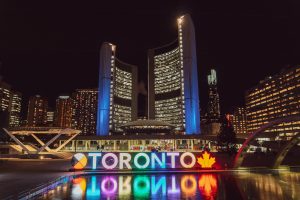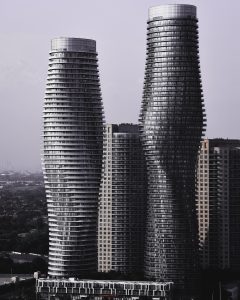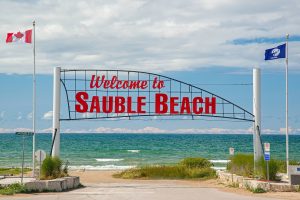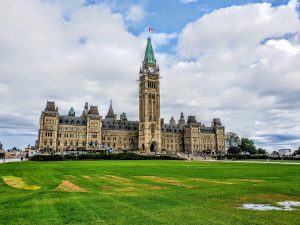Harmari STR announces six new Ontario municipalities to its rapidly growing list of clients who have used their services to bring unregulated short-term rentals (STRs) into compliance, recover lost lodging tax revenue and preserve neighborhood character for their residents. The challenges faced in each municipality are different, and each requires a customized strategy to regulate STRs. Harmari STR is pleased to work with the following cities:
City of Toronto
Tourism Drives: CN Tower, Scotiabank Arena, Rogers Center, Ed Mirvish Theater, Royal Ontario Museum, Ontario Science Center, Toronto Zoo, Distillery District, Entertainment District, Eaton Centre Mall, High Park.
Compliance Update: Toronto made the news in 2019 and 2020 after gun violence occurred at STR party houses. To prevent other such incidents, eliminate ghost hotels, and reduce noise complaints, the City passed a Bylaw in 2019 that withstood an LPAT appeal in September 2020 that requires STR operators to register their properties and restricts them from listing any properties that are not also their primary residences. One advocate for the by-law said, “What this registration process does is that it weeds out all of the commercial operators that have over the last couple of years systematically eroded Toronto’s housing market and turned housing into ghost hotels.” He believed that this rule would eliminate ghost hotels in a matter of months, once the regulations begin to be enforced in January 2021. The City estimates that there were around 20,000 STRs in operation prior to the by-law, and now that has reduced down to around 5,000 STRs in operation after the bylaw came into full force in January 2021.
City of Mississauga
Tourism Drives: Rattray Marsh Conservation Area, Jack Darling Memorial Park, Port Credit, Square One Shopping Centre, a business-friendly municipality, Pearson International – Canada’s largest international airport.
Compliance Update: In January 2021, Mississauga enacted a bylaw with new business licensing requirements which state that STRs will only be allowed in a primary residence used as such for most of the year, and that the operator must list their City license number on all online advertising. Operators must be at least 18 years old, have government-issued identification and assign a contact person. Mississauga has over 2,000 short-term rentals and have begun enforcement and outreach efforts.
Town of South Bruce Peninsula
Tourism Drives: Located between Lake Huron and Georgian Bay, South Bruce Peninsula is known for fishing, hiking, and the Wiarton Willie Festival to celebrate Groundhog Day. Tourists frequently rent out cottages along the shore of Sauble Beach.
Compliance Update: In response to increasing quality of life and nuisance complaints and absentee Short Term Accommodation (STA) operators, the Town began to license and regulate their STAs in January 2021. According to Mayor Janice Jackson, “We’re getting an increasing number of income property purchases where the owners are nowhere to be found, and when there are issues that are happening, nobody knows who to call or they don’t bother addressing issues that arise.” The Town estimates that they may have had over 1,000 STRs out of a residential population of around 8,400. The program will introduce a four per cent Municipal Accommodation Tax (MAT) on STAs, and will require complete, rigorous site plans, floor plans, proof of insurance, and updated contact information for owners and agents. The program will also require STA nuisance issues like noise, parking and trash to be handled promptly. Harmari is providing STA monitoring, outreach, online mobile-friendly registration, and a 24/7 Nuisance hotline for the Town.
Municipality of North Bruce Peninsula
Tourism Drives: Flowerpot Island, Big Tub and Cove Island Lighthouses, boat tours, SCUBA diving, and cottaging.
Compliance Update: The Municipality has around 600 STAs, many on beachfront properties similar to those in South Bruce Peninsula. Prior to the licensing regulations passed in 2021, STAs were technically illegal in the Municipality. Without any list of licensed operators, it was difficult to know who to contact regarding nuisance complaints, with some residents commenting that they “can’t work it out every weekend with a new set of neighbours.” Now operators are required to provide contact information, adhere to safety guidelines, and risk losing their licenses for failure to comply with terms. Harmari is providing North Bruce Peninsula with STA monitoring, outreach, a 24/7 Nuisance Hotline, and MAT collection services for the Municipality.
City of Oshawa
Tourism Drives: Vibrant downtown area with shops, dining and entertainment, sports and other events at the Tribute Communities Centre, Oshawa Valley Botanical Gardens, Pumphouse Marsh Wildlife Reserve.
Compliance Update: Short-term rentals in Oshawa have increased rapidly, growing from 31 in May 2016 to 113 in July 2018. Complaints about party houses also went up, with reports of the parties continuing even after the police had visited and left. After nuisance reports and complaints from renters about absent hosts, the city launched a new business licensing program in 2020. Now STR operators can rent out only their principal residences, for no more than 28 days in a row, and for no more than 180 total days per year. Operators will need to provide a 24-hour contact who can respond within one hour in case of emergency, buy proper insurance, and limit renters to two people per room and two rooms per property. They will also have to display a visitor’s code that outlines the local by-laws to guests. The licensing fee is $75.
City of Ottawa
Tourism Drives: Parliament Hill, Byward Market, water activities on the Ottawa River, the Canadian Tulip Festival, water sports and ice skating on the Rideau Canal.
Compliance Update: In order to combat party houses, “ghost hotels”, and disappearing housing stock, the city of Ottawa passed by-laws in April 2021 that limits most operators to renting out only their primary residences, requires them to obtain permits, and subjects them to fines going up to $100,000 for violations. After three years the program will be revisited. There are nearly 3,000 STR listings advertised in the city.
Harmari STR developed a three-stage program that meets the needs of city planners, whether they are just beginning to draft STR ordinances or are trying to track down unlicensed hotel operators. In addition to reducing quality of life complaints, clients who work with Harmari STR have seen a 280% return on investment from increased tax revenue. Contact us to learn more about how Harmari STR can assist your Short Term Accommodation compliance program and MAT collection service.






